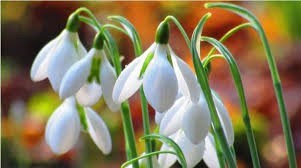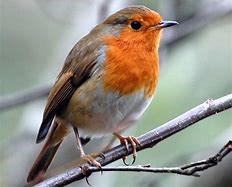Every Child Is Born a Scientist ... it's our duty to foster that wonder and enthusiasm so it remains with them.
Article 29: A child's education should help their mind, body and talents be the best they can. It should also build their respect for other people and the world around them.

I’m sure you’ll agree that the daylight is now starting to stretch further into late afternoon… what a wonderful feeling is it after the dark, cold evenings of the winter. Of course spring is just around the corner too – ever ready to bestow the miraculous signs of new life upon us.
Why not enjoy some fresh air and local nature during February Half-Term by supporting the Great British Bird Watch in 2020 via the RSPB or maybe help your child to develop their Science Capital by using recycled materials to create bird feeders. I have attached an idea of one easy to make model, using pop bottles, at the bottom of my newsletter. You could display the feeders in your garden, on fencing or in a window box. You will help save nature and support wildlife. If you do, please send a photograph to school to show your scientific ideas! Adding a child/parent comment will bring your designs to life and this can be shared with other children. https://www.rspb.org.uk
Along with signs of spring, I’m delighted to share with you this half term’s Science Stars. Science is all around us; science really is everywhere!

Happy Half term, Mrs Woodley
Nursery
The children have had the opportunity to explore ice and paints in Nursery experimenting with mixing colours as the ice begins to melt.
Luke, "The ice is melting, look, with water because it’s warm. Water turns into ice".
Riley, "The ice is melting because it’s hot".
Ashleigh, "I'm making light blue. I mixed the dark blue with the white and it changed colour when the ice was melting".
The children are observing ice outdoors. Bobby and Evie notice the sun shining and discuss what may happen to the ice.
Evie and Bobby, "It’s ice, it’s really cold, that's why it’s ice. We need to break it up. I'm going to do it," Evie says. "My hands are cold, it’s really cold outside today," Bobby says.
Year 3-4R
Olivia - Writing a well presented investigation.
Dan - Identifying that plants breathe in Carbon Dioxide.
Mason - Explaining why a plant has grown without any light.
Danna - For making an effort to answer questions about plants in class.
Year 3-4O
Oliver – asking questions to extend his learning and understand how water is transported around plants (Principle 9)
Tate -– recognised that the cress grew taller because it was seeking out light. (Principle 8)
Tia – Detailed answer to a curious question and beautifully presented work on the function of parts of a plant. (Principle 6)
Todd – Scientific vocabulary when describing the life processes (Principle 6)
Year 3-4D
Harry – sharing excellent facts with the rest of the class about plants and what they need to survive.
Ethan T – working well with others to identify and explore the seven life processes.
Libby – super understanding of photosynthesis.
Luke - writing an excellent conclusion about water transportation in plants.
Year 2P
Lewis – An excellent presentation on a poster about our famous scientist Thomas Edison.
Amber - Asking fantastic curious questions about materials.
Joseph - For working well in a team when investigating how materials can be changed by stretching, bending and squashing.
Oliver - For retaining information about our famous scientist Thomas Edison and recalling facts when sharing with the rest of the class.
Destiny - For referring to our science principles when conducting our experiments with materials.
Year 2W
Myla - for making clear and sensible predictions about what would happen to different materials when we experimented with them.
Harry - for demonstrating excellent scientific skills when investigating materials and their properties.
William - for giving brilliant reasons why different materials are used for different purposes.
Bobbie - for producing a great fact file about Thomas Edison, our focus scientist.
Darcie - for sharing her excellent ideas about how scientists should treat each other, their inventions and ideas.
Reception C
Harley - for investigating with different materials to find out if they were magnetic.
Maddison - for sharing her knowledge of what happens during the different seasons.
Reception J
Harry - for exploring how shadows are made when using the light box.
Arjun - for sharing his observations of what happens in Winter.
Year 1B
Keaton- Amazing questions during our topic on materials. He questioned the difference between objects and their materials.
Rosie- Fantastic use of adjectives to describe a variety of materials.
Lily – Thought carefully about our investigation and how to make it fair.
Dylan- Discussed which materials were waterproof and questioned why.
Year 1C
Jensen - Writing super sentences about Winter.
Oliver - asking about what material balloons are made out of.
Amelia - Wonderful recording of properties of materials with pictures.
Darcey - completing display work about materials beautifully.
Sienna-Rose - always working hard in Science.
Year 5-6C
Oliver – Comparing questions relating to life cycles of different species of animals. Well presented, annotated life cycle diagram.
Ben - Achieving Greater Depth in our recent science assessment! Fantastic! Applying your knowledge and understanding of Animals including Humans. Challenging yourself - Principle 9.
Alexander- Achieving Greater Depth in our recent science assessment! Fantastic! Applying your knowledge and understanding of Animals including Humans. Challenging yourself - Principle 9.
Isobel F – Well presented bird’s life cycle with stages explained. Comparing and contrasting a bird’s life cycle with a human and cat. Linking migration of birds to life cycles.
Max – Applying your knowledge of plant parts and pollen as part of a plant’s life cycle – showing pollination and fertilisation.
Ella-May - Using scientific vocabulary to compare and contrast plant reproduction – using one adult plant with runners or two flowering plants. Identifying differences and answering challenging questions. Making links with our Science Principle 8.
Seren - Using scientific vocabulary to compare and contrast plant reproduction – using one adult plant with runners or two flowering plants. Identifying differences and answering challenging questions. Making links with our Science Principle 8.
Megan - Using scientific vocabulary to name the stages in the frog and butterfly life cycles and discuss what happens. You were able to compare and contrast other life cycles and understand metamorphosis too. Making links with our Science Principles 8 and 9 and presenting your work in detail.
Sofia - Using scientific vocabulary to name the stages in the frog and butterfly life cycles and discuss what happens. You were able to compare and contrast other life cycles and understand metamorphosis too. Making links with our Science Principles 8 and 9 and presenting your work well.
Dominic – Applying understanding to a drama of pollination and fertilisation to show movement of pollen and the role of plant parts in plant reproduction.
Year 5-6B
Luke – Representing a bird’s life cycle accurately. Linking migration to the life cycle of birds.
Sofia – Using scientific vocabulary to name the stages in a range of animal life cycles and discuss what happens. You were able to compare and contrast life cycles too. Making links with our Science Principles 8 & 9 and presenting your work well.
Daniel H - Using scientific vocabulary to compare and contrast plant reproduction – using one adult plant with runners or two flowering plants. Identifying differences and answering challenging questions. Making links with our Science Principle 8.
Simon - Achieving Greater Depth 16/18 in our recent science assessment! Fantastic! Applying your knowledge and understanding of Animals including Humans. Challenging yourself - Principle 9.
Simar - Using scientific vocabulary to compare and contrast plant reproduction – using one adult plant with runners or two flowering plants. Identifying differences and answering challenging questions. Making links with our Science Principle 8.
Oliver - Achieving Greater Depth 16/18 in our recent science assessment! Applying your ever-growing scientific knowledge and understanding. Always contributing to our lessons and helping to develop our Science Capital. Challenging yourself - Principle 9. Fantastic!
Kai – Putting life cycle stages in order and helping other children to understand.
William - Using scientific vocabulary to name the stages in a range of animal life cycles and discuss what happens. You were able to compare and contrast life cycles too. Making links with our Science Principles 8 & 9 and presenting your work well.


